By David Shasha*, April 30, 2010
Over the years there has been a constant spate of books containing the testimonials of American Jews proclaiming their teary-eyed and deeply emotional love of the state of Israel. These books are part of the larger program of Israeli Hasbarah, the form of advocacy that seeks to assert the total primacy of Zionism as the centerpiece of Jewish life the world over.
In order to establish what Israel means to me as a Jew, the first thing I need to do is figure out what it means to other Jews and how that relates to the reality of the Jewish past.
American Jews have been conducting a romantic affair with an Israel whose contours are outlined in two recent movies: In Adam Sandler’s comedy You Don’t Mess with the Zohan and Quentin Tarantino’s Inglourious Basterds, we find that the American Jewish love affair with Israel is based on an almost erotic identification with the perception of Zionism and Israel as a form of revenge fantasy. Sandler’s Zohan is a figure whose sexual potency rests in his skill as a Jewish superhero, a man who kills Arabs to defend the Jewish people. Similarly, Tarantino’s Nazi-era fantasy is a phantasmagoria of violence in the name of Jewish self-doubt and an inferiority complex.
These fantasies bring to mind the idealist aspects of the original Zionist program and its rejection of traditional Jewish identity. The Israeli scholar Oz Almog has examined this rejectionism in his book The Sabra: The Creation of the New Jew:
The Zionists greatly admired the physical beauty of the native, the “Jewish Gentile” who had been anointed king of the new Israel, and they contrasted him with the ostensible ugliness of the Diaspora Jew […]. Writers of this era […] described the native as a robust youth with “gentile” characteristics, a kind of Jewish muzhik, or Russian peasant — strapping, self-confident, and strong-spirited, as opposed to the stereotypical Diaspora Jew, who was pale, servile, and cowardly.
Especially prominent in descriptions of the native are his masculine vitality and health and his alienation from Judaism. The criteria are European-Christian ones, which have their source in ancient Greece and Rome […].
The paradox inherent in Zionism is the way in which it creates the “New Jew” by rejecting what it perceives to be the “Old Jew.” In both cases, the understanding of what it means to be Jewish is based on a completely Eurocentric model; the decrepit Diaspora Jew is seen in terms of the Shtetl Jew who is isolated from the general world, while the ideal Israeli Jew — typified by the Zohan and by the vengeful Jews of the Tarantino fantasy world — is seen as an uber-Gentile.
From a Sephardic perspective this transformation of Jewish identity has very real consequences. As Almog argues later in the book:
The Oriental immigrants, like all other immigrants, were perceived by the Israeli establishment as in need of a cure for the Diaspora disease from which they suffered, a cure that would turn them into Sabras. But in the case of the Oriental immigrants, the usual differences between the natives and the immigrants were supplemented by the cultural differences between East and West. The Yishuv leadership, and the Sabras after them, treated the Oriental immigrants with a mixture of affection, compassion, condescension, and arrogance — the products of the combined ethoses of ingathering the exiles and rejecting the Diaspora. The common wisdom regarding the acclimatizing of Oriental Jewish youth to their new country was that they should discard the Oriental culture, which the establishment considered backward, and ascend to a higher cultural level by adopting the characteristics of the Sabra and the more advanced Western culture.
For the traditional Jew, not just for Sephardim, the state of Israel represents a profound rejection of a millennia-old Jewish identity. The psychological impact of all this is formulated in the irrational American Jewish identification with Israel as the existential center of all Jewish life. Having rejected the traditions of the past, based on the religious values of Torah and Halakhah, contemporary Jews have recreated a religious culture based on the rituals and demands of the Jewish state and Zionism.
In typical Ashkenazi fashion, this new Zionist religion is authoritarian and draconian in its demand for conformity.
Two current examples — just in time for last week’s commemoration of Israeli Independence Day — are the Anat Kamm affair and the ongoing demonization of South African judge Richard Goldstone. Kamm has been charged with leaking confidential military documents to the press, while Goldstone continues to be vilified for the report that he prepared for the United Nations on the 2009 Gaza incursion. Kamm is currently under house arrest in Israel while Goldstone has found himself pressured from attending his own grandson’s Bar Mitzvah.
These two stories speak to the demands of the new Judaism which has replaced the Torah of Moses with the new Torah of Zionism. Had Kamm and Goldstone eaten a ham sandwich on Yom Kippur, they would not find themselves in the trouble they are now in. Rather than judging Jewish behavior in traditional religious terms, the new Zionist imperative seeks to control human behavior and speech by setting out a series of protocols regarding the way in which we see and speak about Israel. This regime is controlled internally by the Jewish community, which determines who is “one of us” and who is not.
The actions of Jews like Anat Kamm and Richard Goldstone speak to the Jewish tradition of self-examination and the idea of justice in a wider sense. The Talmudic tradition teaches that Jews must not allow other Jews to act in ways that violate standards of morality. This tradition extends to the Jewish court as well. Far from exonerating the court as infallible, the Talmudic tradition discussed the ways in which justice could be violated due to judicial error or malice.
But today Israel represents a reversal of the old moral codes. In its ethos is found a cruelty and meanness that is reflected in the way Jews conduct their discourse. Destroying individual Jews who are critical of Israel is seen as a positive commandment of the new Judaism. At the epicenter of this ideology is a pathological paranoia regarding anti-Semitism which often marks the Arab as the primordial enemy of the Jew.
Castigating Arab Jews for their native culture has led to a profound crisis in Sephardic civilization. Sephardim have been transformed by Ashkenazi Zionism into Arab-haters and as witnesses to the barbarity of Arabs and their culture. This has led the Sephardim to reject their traditional past and the wisdom of their Sages, many of whom were immersed in the Arab culture.
Gradually, Zionism has eroded the traditional Jewish past and replaced it with a new identity construct that mimics the authoritarian aspects of rabbinic culture even as it rejects its valuational content. Ironically, the secularization of Jewish tradition has led to a renewal of fundamentalist Orthodoxy in both Zionist and non-Zionist variations.
The Zionist religious Orthodoxy is well-described by Karen Armstrong in her classic book The Battle for God:
The extreme religious Zionists and members of Gush Emunim were also ready for a fight. They were rebels, mounting what they saw as a revolution against secular nationalism on the one hand, and Orthodoxy on the other. Life had changed drastically for the Jews. They felt there was no need for Jews to be constricted by traditions belonging to the Diaspora, because the messianic age had begun.
The irony here is that the standard articulations of Jewish tradition in its liturgy and religious calendar remain in force. A new messianic age has yet to be formally articulated in the liturgy. Anti-traditionalism is a paradox that lies behind the Settlement movement and allows it to become a part of the larger project of an anti-Jewish Zionism.
In the end, those who are on the receiving end of the Israeli whip understand all too well the pressures that have been placed on Jews to conform: Israel is the new God, the new revelation from on High, and all those who reject its commandments are to be excommunicated from the community, marked as Jewish heretics who deny the new order.
For Sephardim, what Israel means at present is not only the ongoing destruction of their culture and heritage and the near-complete triumph of Ashkenazi Judaism, but the requirement that Sephardim bear witness to their own cultural impotence and corruption.
What Israel means to me at the moment is the fact of Jews persecuting other Jews for speaking out and affirming the traditions of the past, of being “Old Jews” rather than “New Jews.”
* David Shasha is the director of the Center for Sephardic Heritage in Brooklyn, New York. This article previously appeared at The Huffington Post and is republished here with the author’s permission.
… I have felt lately that it has become shameful to be an Israeli, and a decent person must feel this shame and blush deeply and clear his throat and whisper to himself the question, what should we do, what should we do, for heaven’s sake, and perhaps even reach far-reaching conclusions.

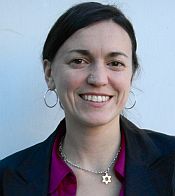 I stood up and unfurled a pink banner that read, “The settlements betray Jewish values” and in Hebrew: “Justice, justice you shall pursue,” a verse from Deuteronomy. The crowd had grown increasingly hostile with each disruption, and I was instantly attacked from all sides. A man in the row in front of me pulled the El Al seat cover off his chair and tried to gag me with it. Another man came up from the side and grabbed me by the throat. I fell into a pile of chairs until two female sheriffs buoyed me up and hustled me out of the room. The police later confided that they were trying to protect me from the angry mob and get me out of there in one piece.
I stood up and unfurled a pink banner that read, “The settlements betray Jewish values” and in Hebrew: “Justice, justice you shall pursue,” a verse from Deuteronomy. The crowd had grown increasingly hostile with each disruption, and I was instantly attacked from all sides. A man in the row in front of me pulled the El Al seat cover off his chair and tried to gag me with it. Another man came up from the side and grabbed me by the throat. I fell into a pile of chairs until two female sheriffs buoyed me up and hustled me out of the room. The police later confided that they were trying to protect me from the angry mob and get me out of there in one piece. Jeff Shapira from San Antonio grabbed one of the protesters by the throat, but when later asked whether he had ever put a woman in a choke hold before, he responded: “Not really. No. I really did not know what was going to happen, I wanted to keep her in check. I was trying to help.”
Jeff Shapira from San Antonio grabbed one of the protesters by the throat, but when later asked whether he had ever put a woman in a choke hold before, he responded: “Not really. No. I really did not know what was going to happen, I wanted to keep her in check. I was trying to help.”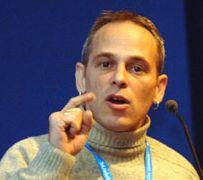 The most pressing problem with the settlements is not that they are obstacles to a final peace accord, which is how settlement critics have often framed the issue. The danger is that they will doom Zionism itself.
The most pressing problem with the settlements is not that they are obstacles to a final peace accord, which is how settlement critics have often framed the issue. The danger is that they will doom Zionism itself.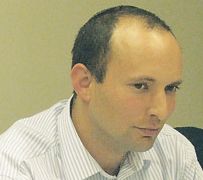 On the other side of the debate are Israelis such as Naftali Bennett, Benjamin Netanyahu’s former chief of staff and the recently named director-general of the settler advocacy group the Yesha Council.
On the other side of the debate are Israelis such as Naftali Bennett, Benjamin Netanyahu’s former chief of staff and the recently named director-general of the settler advocacy group the Yesha Council.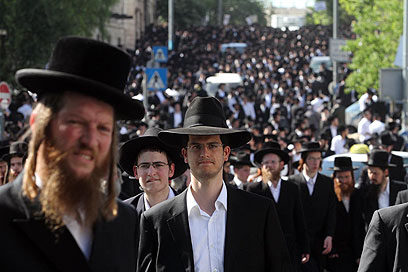 It’s hard to countenance the concept of a “
It’s hard to countenance the concept of a “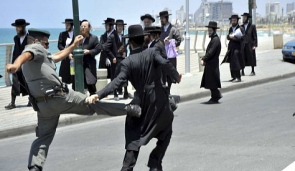 The liberal commentator,
The liberal commentator, 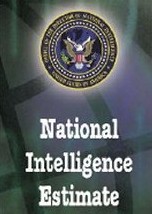 The brutality with which the Iranian authorities have suppressed political dissent since last June’s disputed presidential election has been widely reported. The
The brutality with which the Iranian authorities have suppressed political dissent since last June’s disputed presidential election has been widely reported. The 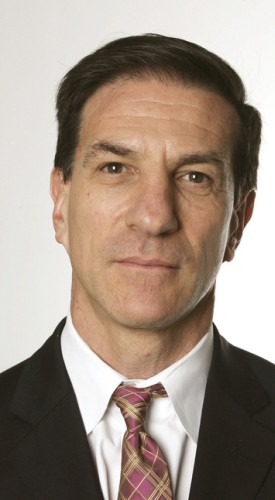 Toward the end of Ethan Bronner’s appearance at Vassar last night, a woman in the aisle melted down yelling at him. “What I’m hearing from you is only one side. Your son is in the IDF. You are Jewish… The way you talk is totally pro-Israel.” Then Fanny Prizant of Woodstock demanded, What is it about the New York Times? Why don’t they have someone else to at least put across the other side of the story?
Toward the end of Ethan Bronner’s appearance at Vassar last night, a woman in the aisle melted down yelling at him. “What I’m hearing from you is only one side. Your son is in the IDF. You are Jewish… The way you talk is totally pro-Israel.” Then Fanny Prizant of Woodstock demanded, What is it about the New York Times? Why don’t they have someone else to at least put across the other side of the story?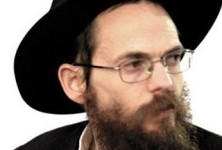 While religious Zionists are primarily concerned with the issue of evacuating settlements, the students at Od Yosef Chai also see IDF ethics as problematic because they are based on “western” or “Christian” morality that equates Jewish lives with those of non-Jews.
While religious Zionists are primarily concerned with the issue of evacuating settlements, the students at Od Yosef Chai also see IDF ethics as problematic because they are based on “western” or “Christian” morality that equates Jewish lives with those of non-Jews.